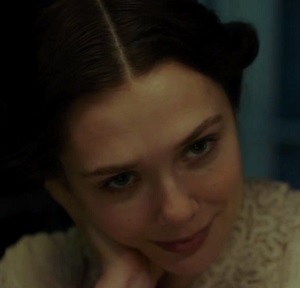Based on the true story of James Gralton (Barry Ward) who returns to his native county Leitrim in Ireland in 1932, after having previously fought in the Irish Civil War and then lived in New York for a decade, and, at public bequest, he then sets about resurrecting the town hall for all sorts of social events like dancing and lessons, things that inject a new lifeblood into the heart of the community. Not everyone, however, is thrilled about this, and the local Catholic priest sees naught but Lucifer at work in the Jazz hands that are shaking in the night (I’m making this sound like ‘Footloose’ 84, it’s not), and thrown into the mix are the thoughts of the IRA with the hall labelled as a Marxist hub, as well as the Devil’s playground.
Of course, we are shown that what the protagonist has created is not only innocent and devoid of any overt political or religious intent, but is also a spark of something worthwhile for the people, rejuvenating the young and old alike in an area where opportunity rarely deigns to show its face. Unfortunately, the opponents of the gatherings have such strong views that they make its very existence political, and what begins as an isolated thing becomes the focus for something much bigger, as Jimmy ends up involved in what is voiced as a major problem throughout the land – that of an enormous divide between the landed gentry and the working class and the resultant eviction of poor, hard working tenants from their family homes that they’ve lived in for years as they can no longer afford the rates.
Where the film finds its main success is with its discussion of the role of the church regarding events and its influence over matters at the time, as well as its attitude towards them, and it highlights the issue well. Where it is less successful is in detailing the political makeup of Ireland at the time – we are given a mention of the background of the Civil War, and the IRA, and get a feel for the what the situation is, but it’s not as clear as it could be, and it feels like a slightly missing segment, nor is the emotional connection to the story as strong as you perhaps might want it to be, but it still resonates enough to hold interest throughout.
This is the latest film from director Ken Loach, who also so happens to be one of The Red Dragon’s top three directors of all time, and who has pulled a bit of a Miyazaki by announcing he was to retire from feature film work after this film, and then hinted he might change his mind – which was wonderful news, but he must never retire as he is one of the few directors who constantly carries a torch for the common man, often using real local people in his films as well as actors, and dramatising real events or social concerns – social realism as it’s called, and although this isn’t for me one of his best films, his work is always of value and always has a relevance for the present day.
The kind of social enterprise at work here, for example, is still something that is largely lacking in many places, even in a city the size of Edinburgh where there’s lots going on, you can easily find people at something of a loss as to what to do with themselves to socialize and just meet people, other than the standard drinking in bars and clubs. There are lots of groups and opportunities to be found online of course, and Ceilidh culture is thriving which is great, but the idea of a centralized hub that everyone is aware of where they can find all sorts of activities and events to just turn up to and then join in with, regardless of who they are or their experience, kind of just doesn’t exist. Seems like a bit of a societal oversight to me …



